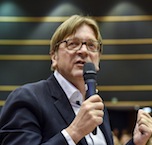
‘More Europe’ is the answer
Interview by Hughes Belin
Q: After Brexit, what is the future of Europe? Where is the EU headed for? What is our common project?
A: I believe the project remains the same as it is stated in the Treaty: an ever tighter Union. The paradox is that [despite the rise of populism] all opinion polls show it is a widely shared goal. European peoples want a European army, a European policy for asylum and immigration, a common fight against climate change, and a common defense of privacy on the Internet. And those who enjoy the Euro do not at all want it to disappear. People sense strongly that their protection and prosperity can be much better guaranteed at European level than at national level.
However, political parties which are supposedly pro-European are [today] wary of pushing for the path of more political integration. Hence they are failing to convince people that the answer lies in ‘more Europe’ and as a result, voters are naturally distracted by populists who lure them with promises of protection behind national borders.
Q: How should European institutions evolve to bring them closer to European citizens? What concrete initiatives could be put in place during the forthcoming parliamentary term?
A: French President Emmanuel Macron, in his op-ed to European people published in multiple newspapers on the 4th of March, concluded by calling for the organisation of a wide-ranging conference on the future of Europe, open to civil society. It would take place after the European elections. This is an excellent initiative to which I lend my full support because it would allow for a reflection on and proposals for institutional adaptations that are essential to introduce more democracy into European decision-making.
My general vision on this is that we have to create a pan-European democratic space to allow European citizens to vote directly for their representatives including the President of the European Commission. Regarding this in particular, the centre-right EPP group in the European Parliament made us waste an opportunity to make progress on this by refusing to allow for transnational lists in the upcoming elections.
Q: What relationships should Europe foster with big global players such as the US, China and Russia? Is cybersecurity a priority in this regard and if so, what can we do about it?
A: The EU has made some progress indeed, as shown by the involvement of the High Representative of the Union for Foreign Affairs and Security Policy, Federica Mogherini, on the Iran nuclear deal and the European unity facing the American U-turn on it. Since the election of US President Donald Trump, the outbreak of a non friendly, or even hostile, American diplomacy towards Europe, has become a huge challenge for the EU. In this context, cybersecurity is obviously a priority if not a new topic for Europe. Russian cyberattacks are a constant source of concern. That is why we have launched legislation to counteract fake news before the European elections.
Q: The new generation of European citizens of voting age is concerned about the fight against climate change. Should it really be a priority for Europe? If the EU runs ahead on the regulatory front, it risk lagging damaging the international competitiveness of many of its industries. How would you tackle this conundrum?
A: I understand the impatience of youth, which finds that the energy transition is not happening fast enough. However Europe is leading the fight against climate change and it is thanks to the EU that the very ambitious Paris Agreement on Climate Change was adopted in December 2015.
The unilateral withdrawal of the US is a hard blow but I think the involvement of China and India, not to mention the private and state-led initiatives in the US including the rebellion of a big state like California will, at the end of the day, force Washington to see reason.
The Paris Agreement is a legal framework aiming at reassuring industry on the political will of national and international authorities to foster and accompany the necessary changes in production and consumption patterns. Naturally, this transition hangs from research and industrial innovation. We have to encourage and stimulate it. For example the EU is poised to ban packaging and other items made of single-use plastic. It is a strong incentive to develop alternatives and the recycling industry. The current political term has been committed to enabling a circular economy and the next one must continue to do so, so that the greening of the economy really translates into more jobs.
Q: What kind of industrial policy do you envisage for Europe? Does EU competition law need to be adapted to the new realities of the global economy? Which sectors should the EU address as a priority?
A: European legislation on competition was designed in the 1980s, when from the perspective of the creation of a single market, we wanted to avoid privatised national ex-monopolies buying each other up to become oligopolies. At the time, international competition was limited to the US and to a lesser extent, Japan. On top of that, our markets were much more closed. The situation is very different today. We have open markets where even the biggest European companies look like dwarfs compared to the behemoths in the US, China, Japan and even Korea and India. Hence there is a need to revisist our competition rules to give a chance to the emergence of European champions.
Priority should be given to the consolidation of the telecommunications sector. In order to stand firm against Google-Amazon-Facebook-Apple, Europe must have a single market for telecoms. This market remains fragmented today, which is an obstacle to the development of European start-ups in the digital economy. I have no doubt that this industrial policy challenge will be a major one for the forthcoming legislative term.




